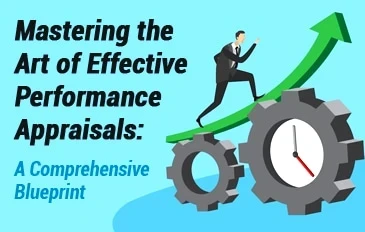Mastering the Art of Effective Performance Appraisals: A Comprehensive Blueprint

Mastering the Art of Effective Performance Appraisals: A Comprehensive Blueprint
Performance appraisals are a crucial tool for assessing and enhancing employee performance in any organization. When conducted effectively, performance appraisals can inspire employee growth, drive productivity, and foster a culture of continuous improvement.
In this comprehensive article, we will explore the key steps and strategies to conduct an effective performance appraisal process. From goal setting to providing constructive feedback and creating development plans, we will provide actionable tips and insights to help managers and HR professionals master the art of conducting performance appraisals.
- Set Clear Performance Expectations: Establishing clear performance expectations is the foundation of an effective performance appraisal process. Clearly define job responsibilities, key performance indicators (KPIs), and goals in collaboration with employees. Ensure that these expectations are aligned with organizational objectives and provide employees with a clear understanding of what is expected from them. Transparent communication and goal alignment are critical for a successful appraisal process.
- Gather Objective Data: Collecting objective data is essential for conducting fair and accurate performance appraisals. Use a combination of quantitative and qualitative data, including performance metrics, project outcomes, customer feedback, and behavioral observations. Avoid relying solely on subjective opinions or personal biases. Use performance management systems, self-assessments, and feedback from peers and stakeholders to gather a comprehensive view of an employee’s performance.
- Provide Regular Feedback: Regular feedback should be an ongoing process rather than a once-a-year event. Establish a culture of continuous feedback where managers provide constructive input and guidance throughout the year. Timely feedback allows employees to make necessary improvements and align their performance with expectations. Incorporate both positive reinforcement and areas for development in your feedback, focusing on specific behaviors and outcomes.
- Conduct a Structured Performance Review Meeting: The performance review meeting is a critical component of the appraisal process. Prepare for the meeting by reviewing the employee’s performance data, feedback, and self-assessment. Create a structured agenda that covers the employee’s achievements, strengths, areas for improvement, and development opportunities. Encourage open and honest dialogue, allowing employees to share their perspectives and aspirations. Use active listening techniques to understand their viewpoints and address any concerns.
- Focus on Strengths and Areas for Improvement: During the performance appraisal, strike a balance between recognizing an employee’s strengths and identifying areas for improvement. Celebrate their accomplishments and contributions to boost morale and motivation. Discuss areas where improvement is needed, providing specific examples and actionable suggestions. Collaboratively set performance improvement goals that are challenging yet attainable.
- Develop Personalized Development Plans: A performance appraisal should serve as a foundation for employee development. Work together with the employee to create a personalized development plan that outlines actionable steps for enhancing skills and addressing development needs. Provide resources, training opportunities, and mentorship to support their growth. Regularly revisit the development plan and track progress during follow-up discussions.
- Document Performance Appraisal Results: Maintain accurate and thorough documentation of the performance appraisal process. Document the performance review meeting, including key discussion points, agreed-upon goals, and development plans. Keep a record of performance data, feedback, and any other relevant information. Documentation serves as a reference for future appraisals, performance discussions, promotions, and compensation decisions.
- Follow-Up and Follow Through: Ensure that the performance appraisal process does not end with the review meeting. Schedule follow-up meetings or check-ins to track progress on goals and development plans. Provide ongoing support, guidance, and coaching to help employees succeed. Encourage open communication and address any challenges or roadblocks along the way. Regular follow-through demonstrates commitment to employee growth and reinforces the importance of performance
Michael DeSafey is a leading executive recruiter for professionals in the construction, engineering, and environmental industries. He is currently the President of Webuild Staffing: www.webuildstaffing.com. To learn more about Michael, or to follow his blog, please visit www.michaeldesafey.com.
Category: Construction, Employer Tips, Engineering, Environmental
